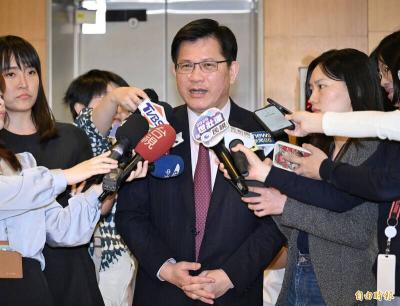The “one fixed day off, one flexible rest day” workweek, which took effect about one month ago, has had repercussions for employers and employees, survey results released yesterday by the Grassroots Influence Culture and Education Foundation indicated.
Of the survey’s 1,102 valid samples, 50 percent of respondents said that their jobs had been affected by the new laws, while 42.7 percent said that their working conditions had not improved.
A majority of respondents, 63.7 percent, said that their employers have stopped asking them to work on their days off due to increased overtime rates mandated by the new rules, forcing them to accept an “indirect pay cut.”

Photo: CNA
The more stringent rules on working hours have caused friction between employers and employees and created an “uneasy” atmosphere in the workplace, 68.1 percent of respondents said.
More than a quarter of respondents, 26.1 percent, said they received a lower year-end bonus because of the longer annual leaves employees are granted under the new workweek to compensate for seven canceled national holidays, with 18.1 percent saying that their bonuses were halved and 8 percent saying they were cut by a third, the survey found.
The cost of living has increased due to higher overtime pay, which was reflected in a general rise in the prices of food products commonly associated with the Lunar New Year, 78.2 percent of respondents said.
Meanwhile, experts attending a news conference on the impact of the changes said that the new laws are “too complicated,” in particular the calculation of overtime fees, which is conducted through four sets of rates that apply to overtime on workdays, national holidays, fixed days off and flexible rest days.
Former Taipei Department of Labor commissioner Chen Yesin (陳業鑫) said that there is a flaw in the rules, in that people asked to work on national holidays are paid less than those who agree to work on their rest days, which he said was “illogical.”
Chen called for more flexibility in the enforcement of rules on the workweek to be drafted by the Ministry of Labor, so that employers and employees can work out a schedule that is to their greatest mutual advantage.
He called on special provisions to be drafted to govern the schedules of workers in the service industry, those working in small and medium-sized enterprises and high-income workers due to the different natures of their work, so that a work schedule that is mutually agreeable to them and their employers can be established.
“For example, some workers at small enterprises are required to work overtime visiting potential clients, but are rewarded with handsome year-end bonuses… These people might seem routinely overworked, but does it necessarily mean that they have been exploited by their employers?” Chen asked.
Citing as an example Germany’s workweek, under which people can work shorter hours on slow days and compensate employers later, Chen said that it might be a model worth referencing when the government drafts labor rules for small and medium-sized enterprises.
Regarding workers’ complaints that they have been denied the opportunity to earn overtime pay, he said that workers’ quality of life is in part determined by their disposable income, but a large majority of them have mortgages to pay, which often accounts for a huge proportion of their salaries.
The government should implement policies to levy income taxes on firms that have established branches overseas or depress house prices by imposing higher taxes on construction firms that hoard real estate to ease the financial burden on workers, he said.
The government should gain insight into the needs of different industries, Ming Chuan University financial law professor Liu Shih-hau (劉士豪) said, calling for finessed rules to be promulgated to replace the current ones that have been applied to all walks of life.

Taiwan would welcome the return of Honduras as a diplomatic ally if its next president decides to make such a move, Minister of Foreign Affairs Lin Chia-lung (林佳龍) said yesterday. “Of course, we would welcome Honduras if they want to restore diplomatic ties with Taiwan after their elections,” Lin said at a meeting of the legislature’s Foreign Affairs and National Defense Committee, when asked to comment on statements made by two of the three Honduran presidential candidates during the presidential campaign in the Central American country. Taiwan is paying close attention to the region as a whole in the wake of a

Chinese Nationalist Party (KMT) Chairman Eric Chu (朱立倫), spokeswoman Yang Chih-yu (楊智伃) and Legislator Hsieh Lung-chieh (謝龍介) would be summoned by police for questioning for leading an illegal assembly on Thursday evening last week, Minister of the Interior Liu Shyh-fang (劉世芳) said today. The three KMT officials led an assembly outside the Taipei City Prosecutors’ Office, a restricted area where public assembly is not allowed, protesting the questioning of several KMT staff and searches of KMT headquarters and offices in a recall petition forgery case. Chu, Yang and Hsieh are all suspected of contravening the Assembly and Parade Act (集會遊行法) by holding

President William Lai (賴清德) has appointed former vice president Chen Chien-jen (陳建仁) to attend the late Pope Francis’ funeral at the Vatican City on Saturday on his behalf, the Ministry of Foreign Affairs said today. The Holy See announced Francis’ funeral would take place on Saturday at 10am in St Peter’s Square. The ministry expressed condolences over Francis’ passing and said that Chen would represent Taiwan at the funeral and offer condolences in person. Taiwan and the Vatican have a long-standing and close diplomatic relationship, the ministry said. Both sides agreed to have Chen represent Taiwan at the funeral, given his Catholic identity and

Taiwan would welcome the return of Honduras as a diplomatic ally if the next president of that country decides to make such a move, Minister of Foreign Affairs Lin Chia-lung (林佳龍) said today. “We would welcome Honduras if they want to restore diplomatic ties with Taiwan after their elections,” Lin said during a legislative hearing. At the same time, Taiwan is paying close attention to the Central American region as a whole, in the wake of a visit there earlier this year by US Secretary of State Marco Rubio, Lin said. Rubio visited Panama, El Salvador, Costa Rica and Guatemala, during which he